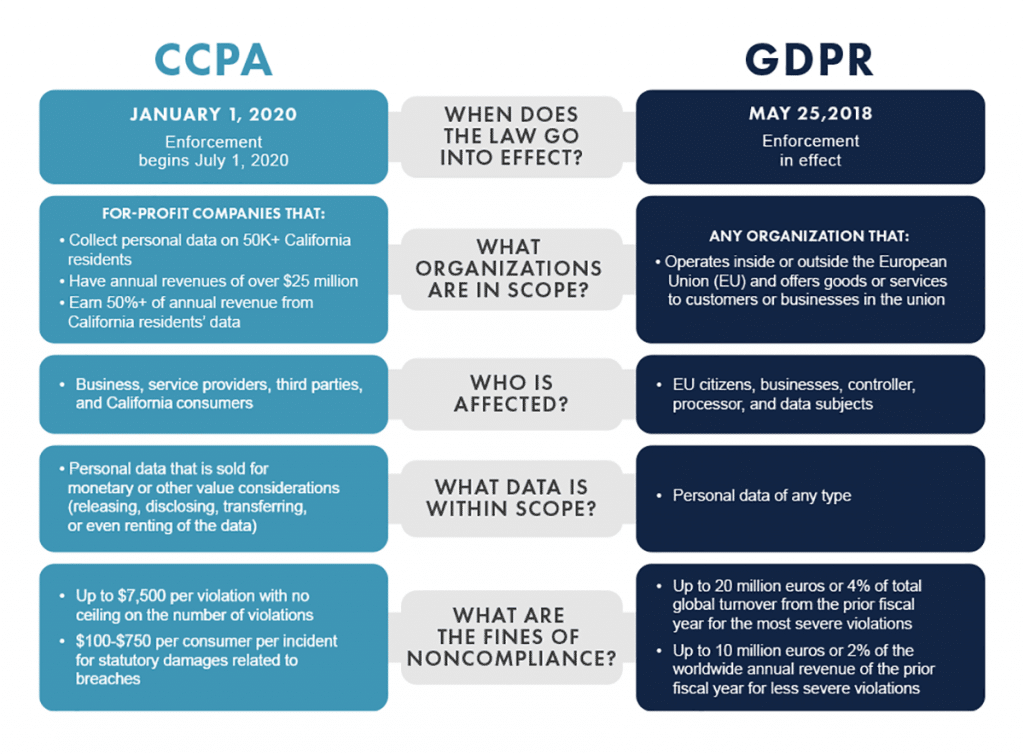Never before has society been so connected to the internet.
From the vehicles we drive to the appliances in our homes, just about everything we encounter in our daily lives has some sort of online element.
As businesses and brands learn to capitalize on expanding growth potential through data-driven marketing, many people are becoming increasingly concerned about how their data is used.
The rules and regulations that govern how personal information (including movement tracking) is captured online consistently evolve to meet demand.
In response, two key pieces of legislation have come up: the General Data Protection Regulation (GDPR) and the California Consumer Privacy Act (CCPA).
These are generally regarded as the basis of future laws that protect consumers around the globe. But how do they differ?
This blog post will focus on the “CCPA vs GDPR” discussion and tell you everything you need to know about these legislations.
- What Is The GDPR?
- What Is The CCPA?
- CCPA vs GDPR: Understanding How They Are Related
- My Business Needs To Comply With The CCPA And The GDPR?
- Wrap Up: Both Legislations Are Designed To Protect Consumers
What Is The GDPR?
The General Data Protection Regulation is a law that came into effect in 2018 in the European Union (EU).
It specifically governs how companies, organizations, and individuals collect pieces of personal data, like:
- Names.
- Geographic locations.
- Email addresses.
- Browser history data.
These regulations apply to a variety of websites and online sources.
Penalties can be as high as several thousand dollars or 4% of your company’s global annual revenue for just a single infraction.
That means it doesn’t matter if you have just a basic informational page or a full eCommerce store — you’ll want to do everything you can to ensure you’re following these guidelines appropriately.
While it was originally designed to give individuals more control over who has access to their information, the effects of this regulation have impacted the world.
In fact, even if you’re a small business in the middle of America, you still need to double-check your website to ensure overall compliance.
Why?
You can’t always control if you have visitors from the EU.
That’s why it is so crucial that you make the appropriate changes to your site, even if you don’t feel as though you’ll have visitors from this region anytime in the near future.
What Is The CCPA?
The California Consumer Privacy Act is an additional piece of legislation that controls how websites collect specific pieces of data from visitors.
Specifically, it gives consumers details on how their personal data is used.
Individuals cannot be discriminated against for exercising their rights under the CCPA, and they have the right to:
- Opt-out of the sale of personal information.
- Delete personal information.
The CCPA is a first step in American regulation of how personal data is used.
Penalties for the CCPA remain steep, with fines leading into the thousands if your website is seen as non-compliant to these regulations.
However, the attorney general in the state has also vowed to make examples of businesses that are clearly ignoring the guidelines.
This is why it is even more important to stay within the guidelines.
CCPA specifically pertains to those who live in and businesses that operate in California and have a gross annual revenue over $25 million or collects the personal information of over 50,000 consumers.
However, as a state with a larger economy than Great Britain, one could easily see why this is just as important or equal to the GDPR in terms of magnitude.
CCPA vs GDPR: Understanding How They Are Related
While it might seem like the CCPA and the GDPR are identical, there is a distinction between them.
Knowing this is a key factor in ensuring you follow guidelines that meet the needs of both.
Likewise, you’ll want to have a firm grasp of why they are important in the given regions they were enacted.
While one is specific to European consumers, the other only deals with those who live in California.
If you’re collecting information from website visitors broadly (meaning anyone who comes to your site) or they meet certain criteria, it might be necessary to alter your collection practices accordingly.
Let’s look at similarities and differences now.
What do the CCPA and the GDPR have in common?
Before we can talk about the differences in the two different regulations, we need to first address how they’re similar.
➤ First, it is important to note that both laws cover any information that relates to an identifiable person.
This can be something as simple as an IP address, email, phone number, name, or whatever else that could specifically match up to an individual.
➤ Second, they both concern informing those you collect information from how that data is stored and used.
➤ Third, both laws control the individual’s ability to opt-out of the practice.
This is a crucial element because it takes control from the business and puts it back in the hands of the individual consumer.
What are the differences between the CCPA and the GDPR?
➤ A major element between the two that is substantially different is the scope and territory of the two laws.
GDPR is easily identifiable as much broader and includes a larger group of individuals that are regulated.
➤ Also, in regards to the data deemed protected, CCPA takes the GDPR a bit farther by specifically naming information that is linked at the household or device level.
➤ The GDPR also gives consumers the right to edit or correct their data; this isn’t included in the California law.
➤ Finally, the GDPR is much stricter in that it includes anyone who lives in Europe that is visiting a website versus just those who live in a single American state.
For global firms or those that tend to do a fair amount of digital marketing, this can really be a pain point.

My Business Needs To Comply With The CCPA And The GDPR?
Well, the GDPR is so broad that it’s almost better to just assume that you could have someone from Europe visit your website at any given time.
The chances of it happening are that great.
For the CCPA you must meet specific criteria associated with:
- The area in which you operate.
- The number of people you collect data from within a given year.
- Your overall gross annual income as stated above.
While this does include a lot of businesses, it really excludes quite a few, too.
But the chance of finding yourself on the wrong end of one of these regulations and facing a steep fine is often a greater risk than taking the time to be in compliance.
If your business needs to comply with the CCPA and the GDPR, then you’ll need to make a few changes to your website.
For example, your privacy policy needs to explain explicitly how you collect data, the types of information you keep, and how that data is used.
You also need to add to your privacy policy any sales or transfers of that information to third parties.
In addition to the guidelines for making your website GDPR-compliant, you’ll need to take a few extra precautions to cover the California regulation.
The good news?
They’re not too extensive compared to what the European law already requires.
To make this happen, you or your webmaster should update your privacy policy to include a notation about CCPA.
Further, you’ll want to add information about the selling of private data and a link to opt-out of the process.
The regulations are similar enough that these minor changes are an easy way to ensure double protection and compliance when implementing.
Wrap Up: Both Legislations Are Designed To Protect Consumers
Keep that in mind in your “CCPA vs GDPR” analysis.
Yes, some companies will have to make adjustments in their handling of personal data to ensure that all regulations are followed on a consistent basis.
And while it might seem like a bit of a hassle, the overall point is to protect consumers and give them the flexibility in knowing how their personal data is stored and sent.
From a business perspective, it can be a challenge, but on a personal level these laws make absolute sense.
So it is a great idea to ensure you’re meeting all of these guidelines before there’s an issue in the future that leads to hefty fines and lengthy court costs.
Are you ready to learn more about data collection and why it can be a strong marketing strategy for your business as long as you’re in compliance with regulations?
Then check our post on the advantages of a data strategy!








